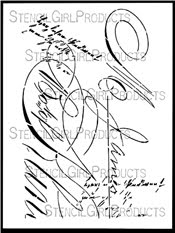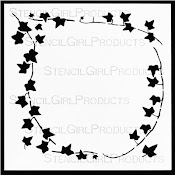How's this for a complex image?
My first print, with black acrylic paint and my 6" x 6" Swatton Links Stencil, was on an old certificate that had previously been tinted blue.
After the black paint dried, I did a "rainbow print" using 6" x 6" Garden at Nemours Mask. ("Rainbow" printing will be the topic of a future post.)
Below is another complex image of several layers. This time, I used my 6" x 6" stencil Kaleid with pink acrylic paint to create a base layer on dark gray paper. Once that paint had dried, I again added a rainbow layer with yellow and red acrylic translucent paint, with
Garden at Nemours Mask.
Below is another kind of complex image, this one created on stretched canvas with modeling paste applied thru my 9" x 12" Longwood Florals Stencil. After the modeling paste had hardened, I sprinkled the canvas with water-soluble pigment powders. (I use Brusho brand but others are available.) The complexity happened when I gently misted the raised floral elements, and the negative space around its elements, with water in a spray bottle. The pigment powders then released their individual colors. You can click on the image below to enlarge it and better see detail --
Below is another complex image of several layers. This time, I used my 6" x 6" stencil Kaleid with pink acrylic paint to create a base layer on dark gray paper. Once that paint had dried, I again added a rainbow layer with yellow and red acrylic translucent paint, with
Garden at Nemours Mask.
Of course, the most popular way to achieve complexity is to use layer after layer of paint and either a variety of stencils, or, as in the case below, the same stencil. Over and over, using different colors within the same color family, I used my 9" x 12" Winter Berries Stencil on stretched canvas. Each time I applied a layer, I not only changed shades of color, but also changed the stencil's position on the canvas.
Today's stencils include:
 |
| Garden at Nemours Mask (6" x 6") |
 |
| Kaleid (6" x 6") |
 |
| Swatton Links Stencil 6" x 6") |
 |
| Longwood Florals Stencil (9" x 12") |
 |
| Winter Berries Stencil (9" x 12") |
Thank you for stopping here today!
























































































